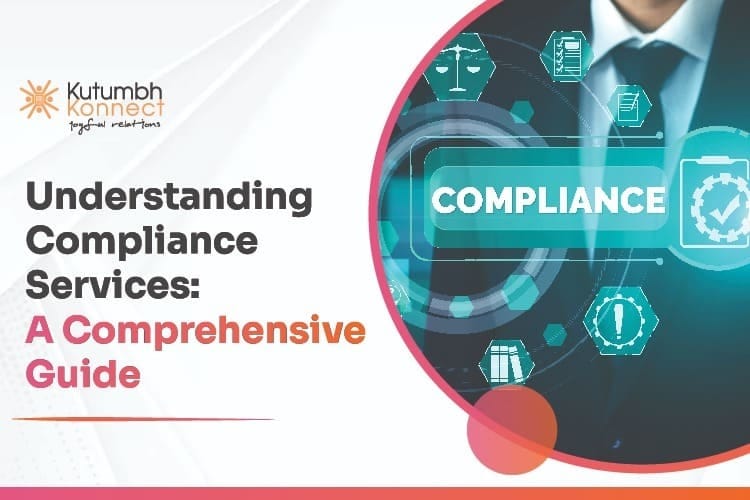Understanding Compliance Services: A Comprehensive Guide

Compliance has emerged as a crucial factor for organisations to grow business successfully. With the changing industry standards and high legal framework demands, companies seek compliance services to keep up. So, allow us to help you get an understanding of compliance services in India, their relevance, major areas of activity, and the benefits organisations can receive.
What are Compliance Services?
Compliance services refer to professional activities used in reaching a legal and appropriate set of standards that applies to the organisational environment, its concerns and functions. It is essential to understand that these services are designed to minimise the threats and promote the non-tainted reputation of commercial transactions.
The Importance of Compliance in India
It has been observed that India’s regulatory environment has evolved considerably in the last few years, with new regulations and changes made to existing ones to enhance corporate governance and provide transparency. Some key regulations include:
Companies Act, 2013
Goods and Services Tax (GST)
Income Tax Act, 1961.
An Act known as the Foreign Exchange Management Act (FEMA)
Prevention of Money Laundering Act (PMLA)
Data Protection and Privacy Legislation
Due to the challenging and constantly changing regulatory environment, compliance services have emerged critical for Indian companies that want to meet legal obligations and stay away from fines and negative publicity.
Key Areas of Compliance Services
Corporate Compliance
This involves section compliance such as annual statements, board meetings, and record-keeping of statutory registers as required by the company laws of the country.
Tax Compliance
The preparation of income tax returns, GST, and all other forms of indirect taxes must also be done punctually and as per the laws required.
Labour Law Compliance
It includes items like employee benefits, occupational health issues, and labour laws.
Environmental Compliance
Observing legal requirements concerning the protection of the environment.
Data Protection and Privacy Compliance
Assisting organisations in following legal provisions related to data protection and preserving confidential information.
Industry-Specific Compliance
Meeting industry-specific regulatory needs that may apply to sectors like health services, banking, or manufacturing.
Anti-Money Laundering (AML) Compliance
Helping financial institutions practice necessary measures to combat money laundering.
Benefits of Engaging Compliance Services
Risk Mitigation: Compliance services act as a preventative measure to mitigate any risk before it comes to a legal compliance or high-profile issue.
Cost Savings: Despite the initial costs, compliance services can be viewed as a cost-saving measure since they prevent large losses in the form of potential fines, penalties and legal fees.
Improved Efficiency: Outsourcing compliance tasks helps companies concentrate on their core activities; at the same time achieving compliance goals.
Expert Knowledge: Leading compliance service providers hire people who are well-versed with the ever-changing compliance requirements and recommendations.
Enhanced Reputation: Focusing on compliance can enhance a company’s image with stakeholders, customers, investors, and regulators.
Choosing the Right Compliance Service Provider
When selecting a compliance service provider, consider the following factors:
1. Expertise: Search for firms that have already worked in your industry and have knowledge of the compliance issues involved.
2. Technology: Today’s prominent organisations of compliance services employ sophisticated software as well as tools to facilitate processes and increase effectiveness.
3. Customisation: Make sure that the provider can adapt to the size and requirements of your business.
4. Reputation: Check customer reviews and feedback on how the specific provider has helped them in particular tasks.
5. Scalability: Select an option that fits the best according to your growing business and shifting compliance requirements.
The Future of Compliance Services in India
As the business environment in India is transforming further, compliance services can be expected to play an even more significant role. Let’s check out the trends exhibited in India’s compliance landscape.
Technology Integration
Technological advancements such as artificial intelligence, machine learning, and blockchain also threaten compliance effectiveness by promoting its usage in compliance processes.
Focus on Data Protection
The proposed new Personal Data Protection Bill is expected to push data privacy compliance as a key area.
Environmental, Social and Governance (ESG) Compliance
Increased focus on environmental responsibility and more accountable behaviour from companies.
Regulatory Technology (RegTech)
Emerging trends such as the use of specific software to enhance compliance process efficiency.
Cross-Border Compliance
Generally, as Indian companies increase their operations abroad, knowledge of the regulations of the new jurisdiction will be crucial.
There is a notable demand for compliance services, especially in the context of the Indian business environment which is replete with stringent requirements of various regulatory authorities. Businesses can take compliance services from service providers such as Kutumbh Konnect, which is counted among the top compliance service companies in India. These companies can help shift the focus of the firm towards their core business while accessing expert legal compliances for their entailed legal obligations.
The fact is that the Indian regulatory environment remains in the process of change, which means that evaluating the experience in the matters of compliance as a key activity will remain critical for achieving the goals across the country.
